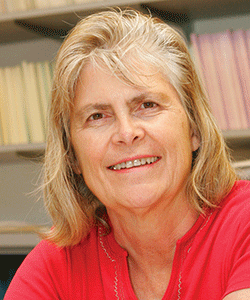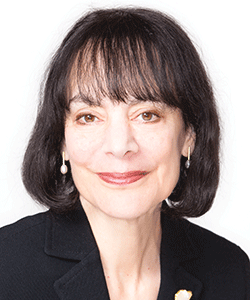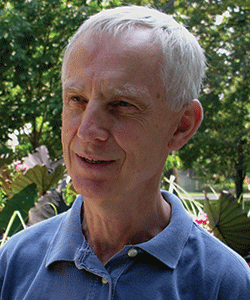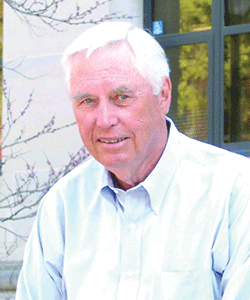Reflecting on a Lifetime of Achievement
As part of APS’s 25th Anniversary celebration, the Board of Directors is honoring 25 distinguished scientists who have had a profound impact on the field of psychological science over the past quarter-century. Eight individuals have been selected to receive the James McKeen Cattell Fellow Award, honoring a lifetime of significant contributions to applied psychological research. The remaining 17 scientists are receiving the William James Fellow Award, which recognizes their significant intellectual contributions to the basic science of psychology. In this issue of the Observer, APS continues the series by profiling four of these eminent scientists: Marilynn B. Brewer, Carol S. Dweck, Douglas L. Medin, and John A. Swets.

Marilynn B. Brewer
Ohio State University (Professor Emerita)
University of New South Wales
William James Fellow Award
APS Past President Marilynn B. Brewer is internationally recognized for her contributions to research in social cognition, especially social identity and intergroup relations. Her work has focused on social identity, collective decision-making, prejudice, and intergroup relations. Her exceptionally rich and rigorous career has spanned several decades and several continents.
Brewer is particularly recognized for her theory of optimal distinctiveness, based on the idea that the conflicting costs and benefits of sustaining an optimal group size would have shaped social motives at the individual level. The theory posited distinct, and opposing, drives for individual differentiation and group belonging. As needs for inclusion in a group are satisfied, needs for differentiation become more salient, motivating social identification with distinctive groups that could simultaneously satisfy both needs. Optimal distinctiveness theory provided a framework supporting her increasingly sophisticated range of research studies with students and colleagues throughout the world on intergroup perception, stereotypes, priming effects, and self-concepts.
Brewer’s early work was based on ethnographic interview and survey data from East Africa. From that experience she developed a career-long interest in ethnocentrism and ingroup bias, arguing that preference affect and treatment of ingroups is independent of prejudice or derogation of outgroups. Her work on “ingroup love vs. outgroup hate” has had a profound influence on research and theories of intergroup relations and the nature of social identity. Brewer’s work is not only highly regarded, but critically relevant to the issues of social life in our increasingly globalized world.
Read Marilynn Brewer’s reflection on “25 Years Toward a Multilevel Science” in the September 2013 issue of Perspectives on Psychological Science.

Carol S. Dweck
Stanford University
James McKeen Cattell Fellow Award
As one of the world’s leading researchers in the field of motivation, Carol S. Dweck’s work bridges developmental, social, and personality psychology, and examines the mindsets people use to guide their behavior. Her work has demonstrated the role of mindsets in people’s motivation and has shown how praise for intelligence can undermine motivation and learning.
Dweck’s empirical work has revealed that when we see ourselves as possessing fixed attributes (the fixed mindset), we blind ourselves to our potential for growth and prematurely give up on engaging in constructive, self-improving behaviors. In contrast, seeing the self as a developmental work in progress (the growth mindset) can lead to the acquisition of new skills and capabilities. Dweck has studied the developmental roots of these mindsets.
This theoretical framework has been used to address a variety of societal concerns, such as achievement gaps between ethnic or gender groups. Dweck finds that victims of negative stereotypes who have (or are taught to adopt) a growth mindset then take a mastery-oriented stance to achieve their goals even in unfavorable learning environments. As a result, they can excel despite the obstacles they face.
The impact of Dweck’s work has spread to other domains beside academic achievement, including willpower, conflict resolution in the Middle East, racial prejudice, and adolescent aggression. Her rigorous research has been applied extensively in schools and organizations to empower children and adults around the world.

Douglas L. Medin
Northwestern University
William James Fellow Award
Best known for his research on concepts and categorization, APS Past President Douglas L. Medin studies how our ideas of the natural world develop, examining biological thought from a cross-cultural perspective. He also investigates the role of culture and moral values in the decision-making process.
Through a collaboration with researchers on the Menominee Reservation in Wisconsin and the American Indian Center in Chicago, Medin has explored the scientific reasoning orientations of children across cultures, as well as across urban versus rural populations. This research aims to develop workable interventions to improve students’ understanding of science in the classroom. Medin and his colleagues pursue the idea that “framework theories” relevant in school and in Native American students’ home lives often clash. He says student performance would improve if teachers taught in a manner similar to the way students learn and practice community values.
Medin has been a model and a strong advocate for interdisciplinary research. Many years ago, he and University of Michigan cognitive anthropologist Scott Atran decided to combine their research interests in human behavior and the environment, and today are co-directors of Northwestern’s Cognitive Studies of the Environment program. In one of their many ongoing collaborations, Medin, Atran, and their colleagues have tackled what’s known as commons behavior. This line of inquiry asks why certain populations don’t destroy a shared environment to fulfill selfish needs. By working with ecologists, biologists, and linguists, in addition to psychologists and anthropologists, Medin and Atran have studied Mayan populations and their land and found that even without these perceived cultural necessities, the natives collectively use the commons without draining its resources. Part of the reason for this behavior, the researchers have found over the years, is rich understanding of forest ecology and seeing the forest spirits as guardians of the forest.
Medin’s work has helped move psychological science beyond simplistic laboratory models on how the mind operates to a broader focus on how our expertise and cultural background influence our mental view of the world.

John A. Swets
BBN Technologies (retired)
William James Fellow Award
John A. Swets is the intellectual father of signal detection theory (SDT) — an idea he borrowed from World War II radar experts and adapted for the study of human decision-making. He has played a key role in adapting SDT as a central tool in the study of perception, and ultimately in the field of medical diagnostics.
Both radar and the human mind have trouble detecting the few meaningful signals amid random noise. The tool that Swets and his colleagues developed — the so-called receiver operating characteristic (ROC) curve — points the way to the best decision threshold for each unique problem.
SDT assumes that the decision-maker is not a passive receiver of information, but an active decision-maker who makes difficult perceptual judgments under conditions of uncertainty. In foggy conditions, for example, we are forced to decide how far away from us an object is based solely upon visual stimulus which is impaired by the fog. Since the brightness of the object, such as a traffic light, is used by the brain to discriminate the distance of an object, and the fog reduces the brightness of objects, we perceive the object to be much farther away than it actually is.
SDT now provides both the conceptual and the quantitative basis for formally making and evaluating most decisions that involve statistical uncertainty. Swets and his colleagues have developed computer programs to help doctors make decisions when looking at X-ray images. His work has had widespread implications not only for psychological science, but for the medical profession.





APS regularly opens certain online articles for discussion on our website. Effective February 2021, you must be a logged-in APS member to post comments. By posting a comment, you agree to our Community Guidelines and the display of your profile information, including your name and affiliation. Any opinions, findings, conclusions, or recommendations present in article comments are those of the writers and do not necessarily reflect the views of APS or the article’s author. For more information, please see our Community Guidelines.
Please login with your APS account to comment.